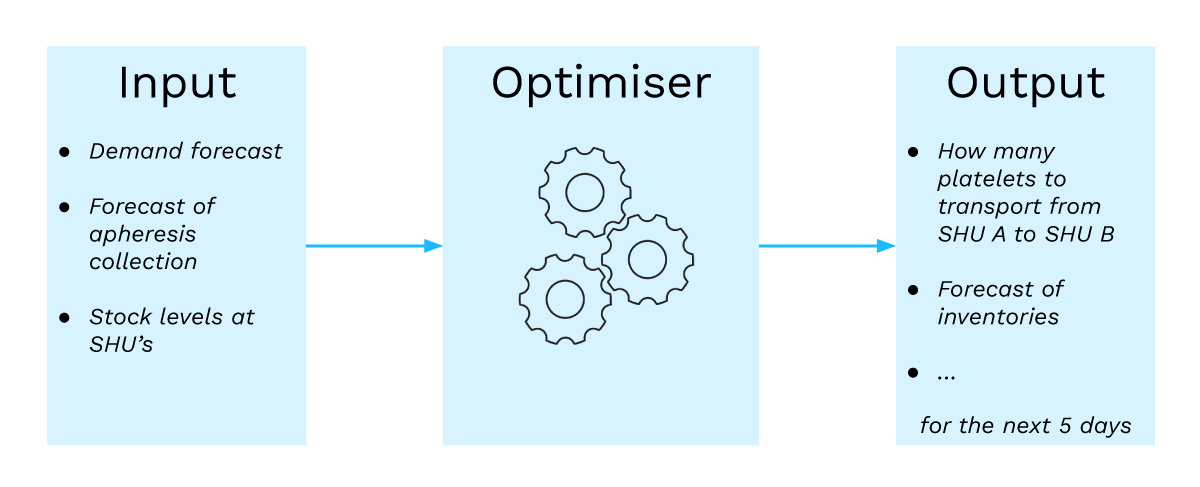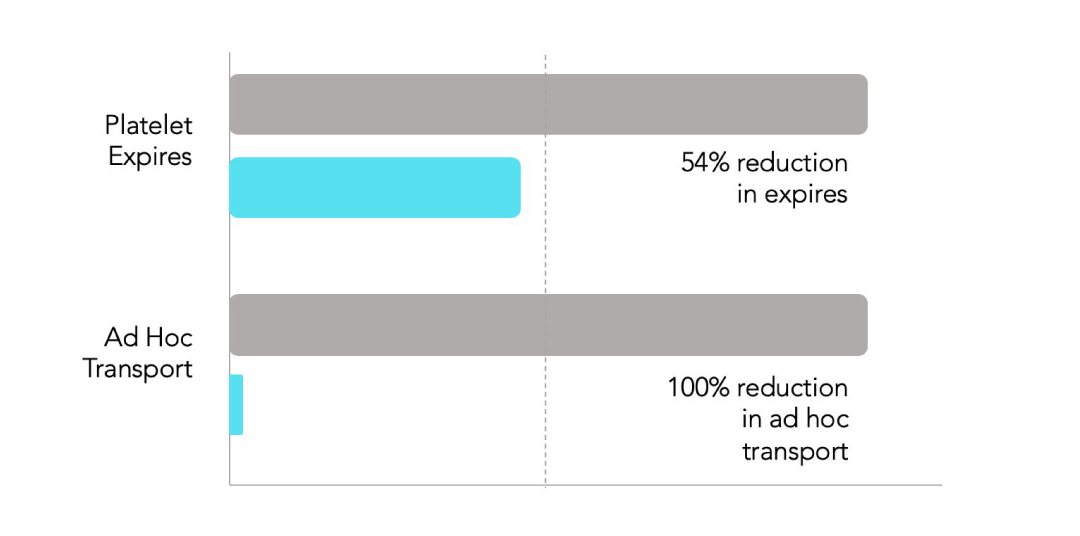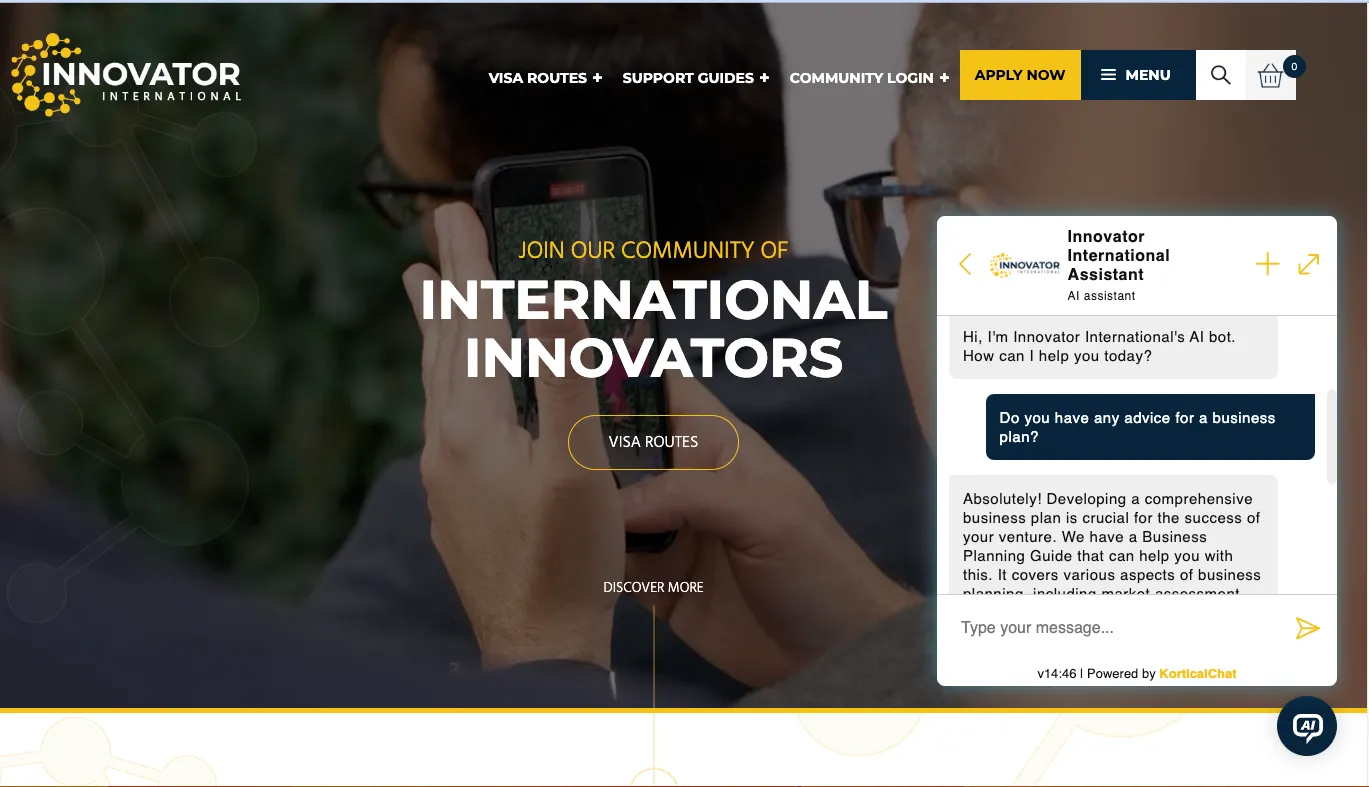In collaboration with the

AI supply chain optimisation for platelets to reduce costs

- Cutting edge AI solution to optimise a complex, short-life blood product, supply chain
- 54% reduction in expired platelets
- 100% reduction in costly Ad Hoc transport
- Reductions in expiries while still keeping the “In Full” delivery rate at the same high level
- Existing process used a machine learning forecasting tool and manual statistical modelling on top. The new solution was fully automated Machine Learning
- Eliminates the dependence on a complex ensemble of spreadsheets created on top of the current software to cope with the complexity of platelet forecasting



The Background
The most common blood products have a short shelf life, in fact, platelets only last 7 days. Hospitals need a stock of blood in different blood types, antigens, collection methods and more, so they can meet the patients’ needs and ultimately save lives. Ensuring every hospital has a supply at all times, of a blood type that a patient can receive so that they don’t have to use medication to aid acceptance, while at the same time minimising platelet overstocking which could then expire, is a complex problem which involves understanding supply, manufacturing, distribution, stock holding, logistics and hospital demand.
Objectives
The team at NHS Blood and Transplant wanted to test if AI could help them be more effective at predicting supply and demand with the aim to:
- Reduce Ad Hoc transport costs of getting platelets from one hub to another by 50%
- Reduce expiries by 50% - they are already one of the best operators in the world at minimising expiries but they wanted to push this even further
Having worked together on a previous successful NHSBT project where they commissioned Kortical to use our AI as a Service platform to improve the prediction of the waiting time for a kidney donation, they chose Kortical to partner with again for this project. For this we used our AI consulting army of data scientists and developers as well as our AI platform to deliver this solution.
Our Approach
We started by gathering the requirements with the many stakeholders that rely on accurate platelet predictions and at the same time kicked off the data governance process with the three NHS trusts. Sidenote - if you are thinking of doing any project that requires NHS trust level data then kick off that process at the very start, before you have defined anything as that process often takes months longer than you planned so the earlier the better.
The starting point for machine learning was to use the NHSBT data to predict demand for all 40 different blood products across 15 different distribution hubs: every day the ML model predicts how many platelets will be ordered by the hospitals for each blood product and each stock holding unit. This had its challenges due to some blood types being quite infrequently used in some of the smaller distribution hubs.
To link our demand forecasts to stock, we also needed to predict the supply of platelets. Supply comes from donations from the brilliant British public, which works by appointment. Most of the time appointments are adhered to, but sometimes life gets in the way. Moreover, the quantity of platelets donated varies from donor to donor. So predicting the supply, with all these factors built into the AI model is as important as understanding the demand.
Another complexity is that the NHS blood service doesn’t process platelets over the weekend so there are two days where there is no supply created so the model needs to take into account a stock build-up required to ensure full availability when there is no stock for two days.
To be effective at reducing costs we looked at the supply chain from end to end to deliver maximum results, which started with:
- Using advanced ML to predict which donors would attend appointments and the volume generated from those donors
- Predicting the demand required across the blood types (-/+), CMV -, Apheresis / Pooled for each of the 15 regions
- Building an optimiser to crunch the over 700,000 variables to ensure that the right blood products went to the right place while minimising ad hoc transport costs and expires
- Building a simulator to simulate the results so that we could prove out the results before going live, to measure the reduction in expiries and transport costs, while also ensuring that we are continuing to deliver at a high level of In Full rate
- Creating an app that the NHSBT team could interact with to see predicted demand, the stock levels, donor centre collections plans etc..

Data Science Approach
Demand prediction is a time series problem.
These steps included:
- Cleaning and splitting the data into a training set of observations up to 2019 and a test set from the first 6 months of 2019
- Time series transformation, which the platform processes automatically, picking out time features like, how many A- platelets were ordered yesterday, last week, last 4 weeks etc..
- Automatic encoding, normalising, outlier removal etc..
- Creating features like a flag for bank holidays, the orders we already received in advance, days of the week etc..
This data was then fed into the Kortical AutoML platform where our patented AI as a Service, automatically generated thousands of Machine Learning models across a range of algorithms including Deep Neural Networks and Extreme Gradient Boosting. It combined these models with automated feature creation and cleaning steps to build the best performing models for this business problem.
In this case the top model generated for demand prediction was XGBoost.
The Results
In 6 months we went from data to an AI powered app that delivers exceptional results:
- 54% reduction in expired platelets
- 100% reduction in costly ad hoc transport
- Reductions in expiries while keeping the on time, in full delivery rate at the same high level


Supply Chain App
Turning the AI / ML models ready for production was made easy using the Kortical Cloud API as the code is hosted for the models and displays the UI.
The Cloud API hosts the code, managing the app for scale, failover, redundancy, making building cloud based AI apps / microservices very straightforward.
The easy to use dashboard enables the NHS BT team to eliminate the systems and spreadsheets that they had built on top of their current software to cope with the complexity of platelet demand forecasting and have a view that all relevant stakeholders can see at the same time and collaborate with where required.

Ready to automate real work?
Contact us to see a focused demo and explore the quickest path to production.
Thank you!
A Kortical team member will be in touch shortly

























